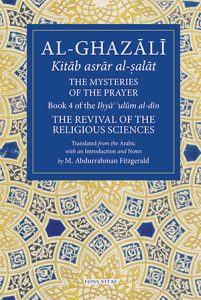Al-Ghazali The Mysteries of the Prayer (Ihya Ulumuddin Series No. 4)

Author: Imām Al-Ghazali
Translator: M. Abdurrahman Fitzgerald
Publisher: Fons Vitae Publishing
Year of Publication: 2018
Print Length: 240 pages
Genre: Islamic Studies / Quranic Studies; Theology, Ethics and Philosophy; Islamic Law & Jurisprudence, Science; Qur’anic Reflection, Supplication & Prayers; Non-Fiction / Religious Studies
Topic: Islam, Qur’an, Pillars of Islam, Islamic Pillars of Faith
In The Mysteries of the Prayer and Its Important Elements, book four of the 40 books of the Revival of the Religious Sciences, Abū Hāmid al-Ghazālī explains the inner and outer meanings of the prayer, a central practice for Muslims. He explains the acts involved in the outward elements of the prayer and outlines which of these acts are obligatory and which are sunna.
He then discusses the inward requisites of the prayer—the practices of the heart— and presents practical remedies for a distracted heart. He also discusses the annual prayers and the prayers and supplications related to events such as eclipses, the prayer for rain, guidance, and need. This readable yet comprehensive work covers an array of issues from the essential outward aspects of how to pray, to the inward aspects of the state of the heart during the prayer and how to humble oneself completely. As a practical, yet profound book, it is essential reading for Muslims who seek a deeper comprehension of prayer, and for all those interested in understanding the meaning and place of prayer in Islam.
Table of Contents
Editor’s Note
Biography of Imām al-Ghazālī
About the Revival of the Religious Sciences
Translator’s Introduction
Acknowledgments
The Mysteries of the Prayer and Its Important Elements
Chapter 1
On the Merits of Prayer, the Prostration, the Congregational [Prayer], the Call to Prayer, and Others
The Merits of the Call to Prayer / The Merits of the Obligatory Prayers / The Merits of Perfectly Completing the Main Parts of the Prayer / The Merits of the [Prayer in] Congregation / The Merits of the Prostration / The Merits of Reverence / The Merits of the Mosque and Places of Prayer
Chapter 2
On How to Perform the Outward Elements of the Prayer, Beginning with the Takbir and What Comes Before It
The Recitation / The Cycle (rukū’) and What Accompanies It / The Prostration / Reciting the Testimony / Matters That Are Prohibited in the Prayer / Distinguishing the Obligatory from the Sunna Elements
Chapter 3
The Inward Requisites [of the Prayer]: Practices of the Heart
Humility and Presence as Requisites in the Prayer / Inner Dispositions by Which the Life of the Prayer Is Completed / The Means Through Which These Six Dispositions Arise / The Effective Remedy for a Heart Which Is Not Present in Prayer / Details of What Should be Present in the Heart / Stories of Those Who Were Humble in Their Prayers
Chapter 4
On the Imām and [His] Example
Chapter 5
On the Merits of the Friday Prayer, the Manners [Relating] to It, Its Sunna, and Its Requisites
On the Merits of the Friday Prayer / Concerning the Requisite Conditions for the Friday Prayer / The Sunna Elements / Exposition of the Manners Related to the Friday Congregation / Concerning Manners and Sunna Practices
Chapter 6
Various Questions Which Are Generally Troubling to People and About Which an Aspirant Should Know
Question [concerning the actions and movements…] / Question [on the ruling about removing sandals…] / Question [on the ruling about spitting during the prayer.] / Question [concerning how a follower should stand…] / Qustion [on the ruling about latecomers.] / Question [about missing the prayer…] / Question [about the ruling of one who sees some impurity…] / Question [about the prostration of forgetfulness.] / Question [on an effective remedy for someone…] / Question [on the conditions for correctly following the imām.] / Question [about enjoining what is right…]
Chapter 7
On Supererogatory Prayer
Category 1: The eight prayers that are repeated daily and nightly / Category 2: Prayers that occur weekly / Category 3: Prayers that reoccur yearly / Category 4: Supererogatory prayers related to events
Bibliography: Works in Western Languages / Works in Arabic
Indexes: Index of Qur’ānic Verses / Index of Hadīth / Index of People and Places / Subject Index
About the Translator

Imām Abu Hamid al-Ghazali is a 11th century Muslim scholar. He was one of the most prominent and influential philosophers, theologians, jurists, and mystics of Sunni Islam. Al-Ghazālī was born at Ṭūs (near Mashhad in eastern Iran) and was educated there, then in Jorjān, and finally at Nishapur (Neyshābūr), where his teacher was al-Juwaynī, who earned the title of imām al-ḥaramayn (the imam of the two sacred cities of Mecca and Medina). He was active at a time when Sunni theology had just passed through its consolidation and entered a period of intense challenges from Shiite Ismâ’îlite theology and the Arabic tradition of Aristotelian philosophy (falsafa). Al-Ghazâlî understood the importance of falsafa and developed a complex response that rejected and condemned some of its teachings, while it also allowed him to accept and apply others. His great work, Iḥyāʾ ʿulūm al-dīn or Ihya Ulumuddin (“The Revival of the Religious Sciences”), made Sufism (Islamic mysticism) an acceptable part of orthodox Islam.
Source: https://plato.stanford.edu/entries/al-ghazali/
More from Imam al-Ghazali in this library, click here.

Michael Abdurrahman Fitzgerald is the Director of the Center for Language and Culture, Marrakech, and the author of several books, including Ibn Qayyim al-Jawziyya on the Invocation of God.
Source: https://www.barnesandnoble.com/w/the-mysteries-of-the-prayer-and-its-important-elements-michael-abdurrahman-fitzgerald/1128932461
More from M. Abdurrahman Fitzgerald in this library, click here.
